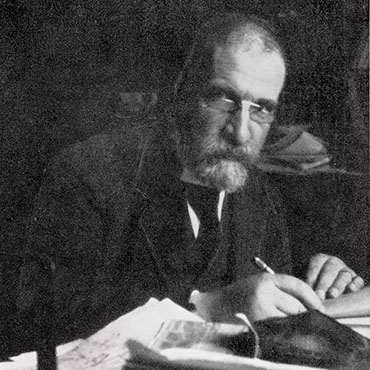Morpurgo was born in 1860 in Trieste to a family of Ashkenazi Jews of ancient Slovene origins. At a young age he moved in irredentist circles. He was a friend of Guglielmo Oberdan and of Albino Zenatti, and spent some months in prison for his anti-Austrian activities. He found refuge in Rome and enrolled at the Sapienza University, where he was a pupil of Ernesto Monaci, and graduated in literature in 1881, in an environment seething with nationalist ideals, ideals that, while he was still a student, had prompted him to publish clandestinely the first edition of Carducci’s Saluto italico. He had an early interest in the preservation of the heritage and made every effort to urge that the Ashburnham collection of manuscripts, which he had seen in London during a study visit, should be acquired by the Italian state, as it contained many pieces that had been removed from the Biblioteca Medicea Laurenziana.
His move to Florence in 1884 signalled the beginning of his career in libraries: at first under-curator of manuscripts at the Biblioteca Nazionale Centrale in Florence, then librarian at Palermo, and later at the Laurenziana in Florence, director of the Biblioteca Riccardiana in Florence, then of the Marciana in Venice and finally successor to Desiderio Chilovi as director of the Biblioteca Nazionale Centrale in Florence, a post he held until his retirement in 1924, a time spent in a bleak climate of hatred of fascism. As a scholar and cultural organiser, he had played an active part in the launch of important activist and scientific journals, such as the “Giornale storico della letteratura italiana” and the “Rivista critica della letteratura italiana”. He had produced catalogues of important manuscript collections for the libraries of Florence and bibliographical works on ancient material. As a director he promoted the arrangement and enlargement of library stock, collaborative bibliographical works on national production and exchange relationships with foreign countries, with such results that he was considered a role model by the Italian librarians gathered in conference decades later.
All this led to his becoming a member of numerous academies and cultural associations. Morpurgo became director of the Nazionale in Florence when the work on the national edition of Galileo was well past the halfway mark. Nevertheless his collaborative approach, in contrast to that of his predecessor Chilovi, left its mark on his relations with Antonio Favaro, relations that already went back many years. In 1908 Favaro and Morpurgo together contributed to the organisation of the exhibition of Torricelli’s work in Faenza, where they put on show to the public the manuscripts of Torricelli and the volumes of the national edition published up to that time.
On the occasion of the publication of the 20th and last volume of indexes, the “Bollettino delle pubblicazioni italiane ricevute per diritto di stampa”, published monthly by the Biblioteca Nazionale Centrale in Florence, contained a brief report, which Favaro maintained came from the pen of Morpurgo, the last words of which were: “The Library which holds the originals of the writings of Galileo and of his school has every reason to be pleased for the happy conclusion of the national edition, remembering that the work of twenty years of Antonio Favaro, Isidoro Del Lungo and Umberto Marchesini, which had been carried out for the most part within the walls of our institution, received extensive assistance from our bibliographical collections and constant help from the dedicated work of our staff. As an enduring reminder of this co-operation and a valuable document for Galilean studies in the future, thanks to the generous provisions of Favaro and his colleagues, the Library will keep a copy of the national edition, containing notes, corrections and other observations made by the editors after printing. The Library will also keep one copy of the large series of miscellaneous monographs about Galileo (over 160), with which Favaro prepared and complemented this great undertaking of his”. Salomone Morpurgo died in Florence in 1942.


